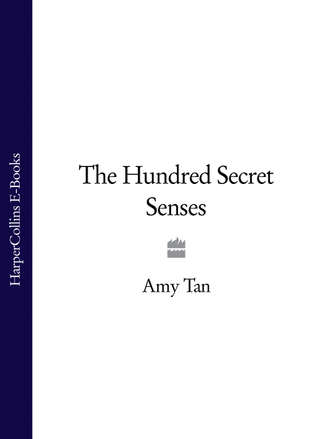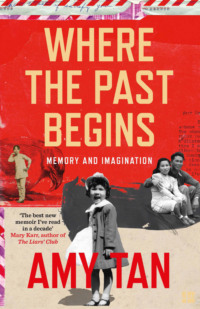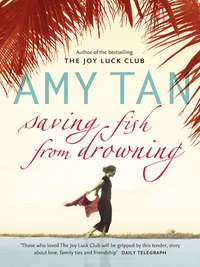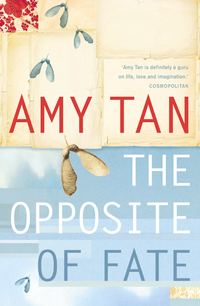
Полная версия
The Hundred Secret Senses
Simon Bishop and I met more than seventeen years ago. At that moment in our lives, we were willing to place all our hopes on the ridiculous – pyramid power, Brazilian figa charms, even the advice of Kwan and her ghosts. We both were terribly in love, I with Simon, he with someone else. The someone else happened to have died before I ever met Simon, although I didn’t know that until three months later.
I spotted Simon in a linguistics class at UC Berkeley, spring quarter 1976. I noticed him right away because like me he had a name that didn’t fit with his Asian features. Eurasian students weren’t as common then as they are now, and as I stared at him, I had the sense I was seeing my male doppelgänger. I started wondering how genes interact, why one set of racial characteristics dominates in one person and not in another with the same background. I once met a girl whose last name was Chan. She was blond-haired and blue-eyed, and no, she wearily explained, she was not adopted. Her father was Chinese. I figured that her father’s ancestors had engaged in secret dalliances with the British or Portuguese in Hong Kong. I was like that girl, always having to explain about my last name, why I didn’t look like a Laguni. My brothers look almost as Italian as their last name implies. Their faces are more angular than mine. Their hair has a slight curl and is a lighter shade of brown.
Simon didn’t look like any particular race. He was a perfectly balanced blend, half Hawaiian-Chinese, half Anglo, a fusion of different racial genes and not a dilution. When our linguistics class formed study groups, Simon and I drifted toward the same one. We didn’t mention what we so obviously shared.
I remember the first time he brought up his girlfriend, because I had been hoping he didn’t have one. Five of us were cramming for a midterm. I was listing the attributes of Etruscan: a dead language, as well as an isolate, unrelated to other languages … In the middle of my summary, Simon blurted: ‘My girlfriend, Elza, she went on a study tour of Italy and saw these incredible Etruscan tombs.’
We looked at him – like, So? Mind you, Simon didn’t say, ‘My girlfriend, who, by the way, is as dead as this language.’ He talked about her in passing, as if she were alive and well, traveling on Eurail and sending postcards from Tuscany. After a few seconds of awkward silence, he looked sheepish and mumbled the way people do when they’re caught arguing with themselves while walking down the sidewalk. Poor guy, I thought, and at that moment my heartstrings went twing.
After class, Simon and I would often take turns buying each other coffee at the Bear’s Lair. There we added to the drone of hundreds of other life-changing conversations and epiphanies. We discussed primitivism as a Western-biased concept. Mongrelization as the only longterm answer to racism. Irony, satire, and parody as the deepest forms of truth. He told me he wanted to create his own philosophy, one that would guide his life’s work, that would enable him to make substantive changes in the world. I looked up the word substantive in the dictionary that night, then realized I wanted a Substantive life too. When I was with him, I felt as if a secret and better part of myself had finally been unleashed. I had dated other guys to whom I felt attracted, but those relationships seldom went beyond the usual good times induced by all-night parties, stoned conversations, and sometimes sex, all of which soon grew as stale as morning breath. With Simon, I laughed harder, thought more deeply, felt more passionately about life beyond my own cubbyhole. We could volley ideas back and forth like tennis pros. We wrestled with each other’s minds. We unearthed each other’s past with psychoanalytic gusto.
I thought it was eerie how much we had in common. Both of us had lost a parent before the age of five, he a mother, I a father. We both had owned pet turtles; his died after he accidentally dropped them into a chlorinated swimming pool. We both had been loners as kids, abandoned to caretakers – he to two unmarried sisters of his mother’s, I to Kwan.
‘My mom left me in the hands of someone who talked to ghosts!’ I once told him.
‘God! I’m amazed you aren’t crazier than you already are.’ We laughed, and I felt giddy about our making fun of what had once caused me so much pain.
‘Good ol’ Mom,’ I added. ‘She’s the quintessential social worker, totally obsessed with helping strangers and ignoring the homefront. She’d rather keep an appointment with her manicurist than lift a finger to help her kids. Talk about phony! It wasn’t that she was pathological, but, you know – ’
And Simon jumped in: ‘Yeah, even benign neglect can hurt for a lifetime.’ Which was exactly what I was feeling but couldn’t put into words. And then he clinched my heart: ‘Maybe her lack of attention is what made you as strong as you are today.’ I nodded eagerly as he went on: ‘I was thinking that, because my girlfriend – you know, Elza – well, she lost both parents when she was a baby. Talk about strong-willed – whew!’
That’s how we were together, intimate in every way – up to a point. I sensed we were attracted to each other. From my end it was a strong sexual charge. From his it was more like static cling – which he easily shook off: ‘Hey, Laguni,’ he’d say, and put his hand firmly on my shoulder. ‘I’m bushed, gotta run. But if you want to go over notes this weekend, give me a call.’ With this breezy sendoff, I’d trudge back to my apartment, nothing to do on a Friday night, because I had turned down a date hoping that Simon would ask me out. By then I was stupid-in-love with Simon – goo-goo-eyed, giggly-voiced, floaty-headed, infatuated in the worst way. There were so many times when I lay in bed, disgusted that I was twitching with unspent desire. I wondered: Am I crazy? Am I the only one who’s turned on? Sure, he has a girlfriend. So what? As everyone knows, when you’re in college and changing your mind about a million things, a current girlfriend can turn into a former one overnight.
But Simon didn’t seem to know that I was flirting with him. ‘You know what I like about you?’ he asked me. ‘You treat me like a good buddy. We can talk about anything and we don’t let the other thing get in the way.’
‘The other what?’
‘The fact that we are … Well, you know, the opposite-sex thing.’
‘Really?’ I said, faking astonishment. ‘You mean, I’m a girl but you’re a – I had no idea!’ And then we both broke into hearty guffaws.
At night I’d cry angrily, telling myself that I was a fool. I vowed many times to give up any hope of romance with Simon – as if it were possible to will myself not to be in love! But at least I knew how to put on a good front. I continued to play the jovial good buddy, listening with a smile on my face and a cramp in my heart. I expected the worst. And sure enough, sooner or later, he would bring up Elza, as though he knew she was on my mind as well.
Through three months of masochistic listening I came to know the minutiae of her life: That she lived in Salt Lake City, where she and Simon had grown up, tussling with each other since the fifth grade. That she had a two-inch scar on the back of her left knee the shape and color of an earthworm, a mysterious legacy from infancy. That she was athletic; she kayaked, backpacked, and was an expert cross-country skier. That she was musically gifted, a budding composer, who had studied with Artur Balsam at a famous summer music camp in Blue Hill, Maine. She’d even written her own thematic variation on the Goldberg Variations. ‘Really?’ I said to each praiseworthy thing he said about her. ‘That’s amazing.’
The strange thing is, he kept speaking about her in the present tense. Naturally I thought she was alive in the present time. Once, Simon pointed out I had smeared lipstick on my teeth, and as I hurriedly rubbed it off, he added, ‘Elza doesn’t wear makeup, not even lipstick. She doesn’t believe in it.’ I wanted to scream, What’s there to believe!? You either wear makeup or you don’t! By then I wanted to smack her, a girl so morally upright she had to be the most odious hominid ever to walk planet Earth, in her non-animal hide shoes. Even if Elza had been sweet and insipid, it wouldn’t have mattered, I still would have despised her. To me, Elza didn’t deserve Simon. Why should she have him as one of her perks of life? She deserved an Olympic gold medal for Amazon discus-throwing. She deserved a Nobel Peace Prize for saving retarded baby whales. She deserved to play organ for the Mormon Tabernacle Choir.
Simon, on the other hand, deserved me, someone who could help him discover the recesses of his soul, the secret passageways that Elza had barricaded with constant criticism and disapproval. If I complimented Simon – told him what he had said was profound, for example – he’d say, ‘You think so? Elza says one of my biggest faults is going along with whatever’s nice and easy, that I don’t think things through hard enough.’
‘You can’t believe everything that Elza says.’
‘Yeah, that’s what she says too. She hates it when I just go along with what’s been handed to me as truth. She believes in trusting your own intuitions, sort of like that guy who wrote Walden, what’s his name, Thoreau. Anyway, she thinks it’s important for us to argue, to get to the marrow of what we believe and why.’
‘I hate to argue.’
‘I don’t mean argue in the sense of a fight. More of a debate, like what you and I do.’
I hated being compared and falling short. I tried to sound playful. ‘Oh? So what do you two debate?’
‘Like whether celebrities have a responsibility as symbols and not just as people. Remember when Muhammad Ali refused to be drafted?’
‘Sure,’ I lied.
‘Elza and I both thought he was great, taking a personal stand like that against the war. But then he wins back the heavyweight title and later President Ford invites him to the White House. Elza said, “Can you believe it?” I said, “Hell, if I were invited, I’d go to the White House too.” And she said, “By a Republican president? During an election year?” She wrote him a letter.’
‘The president?’
‘No, Muhammad Ali.’
‘Oh, right. Of course.’
‘Elza says you can’t just talk politics or watch it happen on television. You have to do something, otherwise you’re part of it.’
‘Part of what?’
‘You know, hypocrisy. It’s the same as corruption.’
I imagined Elza looking like Patty Hearst, wearing a beret and combat fatigues, an automatic rifle perched on her hip.
‘She believes all people should take an active moral position on life. Otherwise the world’s going to end in thirty years or less. A lot of our friends say she’s a pessimist. But she thinks she’s the real optimist, because she wants to do something to change the world in a positive way. If you think about it, she’s right.’
While Simon grew more expansive about Elza’s ridiculous opinions, I’d be dreamily analyzing his features, how chameleon-like they were. His face would change – from Hawaiian to Aztecan, Persian to Sioux, Bengali to Balinese.
‘What kind of name is Bishop?’ I asked one day.
‘On my father’s side, missionary eccentrics. I’m descended from the Bishops – you know? – the family of Oahu Island fame. They went to Hawaii in the eighteen hundreds to convert lepers and heathens, then ended up marrying royalty and owning half the island.’
‘You’re kidding.’
‘Unfortunately, I’m also from the side of the family that didn’t inherit any of the wealth, not a single pineapple orchard or golf course. On my mother’s side, we’re Hawaiian-Chinese, with a couple of royal princesses swimming in the gene pool. But again, no direct access to beachfront property.’ And then he laughed. ‘Elza once said I inherited from the missionary side of my family the laziness of blind faith, and from my royal Hawaiian side a tendency to use others to take care of my needs rather than working to fulfill them myself.’
‘I don’t think that’s true, that stuff about inherited nature, as if we’re destined to develop into a certain kind of person without choice. I mean, hasn’t Elza ever heard of determinism?’
Simon looked stumped. ‘Hmmm,’ he said, thinking. For a moment, I felt the satisfaction of having vanquished a competitor with a subtle and deft move.
But then he remarked: ‘Doesn’t the doctrine of determinism say that all events and even human choices follow natural laws, meaning it kind of goes along with what Elza was saying?’
‘What I mean is,’ and I began to stammer as I tried to recall what I’d skimmed over in philosophy class, ‘I mean, how do we define natural? Who’s to say what’s natural and what’s not?’ I was flailing, trying to keep my pathetic self above water. ‘Besides, what’s her background?’
‘Her folks are Mormon, but they adopted her when she was a year old and named her Elsie, Elsie Marie Vandervort. She doesn’t know who her biological parents were. But ever since she was six, before she knew how to read music, she could hear a song just once, then play it exactly, note for note. And she especially loved music by Chopin, Paderewski, Mendelssohn, Gershwin, Copland – I forget the others. Later she discovered every single one of them was either Polish or Jewish. Isn’t that weird? So that made her think she was probably a Polish Jew. She started calling herself Elza instead of Elsie.’
‘I like Bach, Beethoven, and Schumann,’ I said smartly, ‘but that doesn’t make me a German.’
‘It wasn’t just that. When she was ten, something happened which will sound really bizarre, but I swear it’s true, because I saw part of it. She was in the school library, flipping through an encyclopedia, and she saw a photo of some crying kid and his family being rounded up by soldiers. The caption said they were Jews being taken to Auschwitz. She didn’t know where Auschwitz was or even that it was a concentration camp. But she literally smelled something horrible that made her shake and gag. And then she fell to her knees and started chanting: “Osh-vee-en-shim, osh-vee-en-shim,” something like that. The librarian shook her, but Elza wouldn’t stop – she couldn’t. So the librarian dragged her to the school nurse, Mrs. Schneebaum. And Mrs. Schneebaum, who was Polish, heard Elza chanting “Osh-vee-en-shim” and freaked. She thought Elza was saying this to make fun of her. Well, get this: It turned out “Oświeçim” is the way you say “Auschwitz” in Polish. After Elza came out of her trance, she knew her parents were Polish Jews who had survived Auschwitz.’
‘What do you mean, she knew?’
‘She just knew – like the way hawks know to hover on a stream of air, the way rabbits freeze with fear. It’s knowledge that can’t be taught. She said her mother’s memories passed from heart to womb, and they’re now indelibly printed on the walls of her brain.’
‘Come on!’ I said dismissively. ‘She sounds like my sister Kwan.’
‘How so?’
‘Oh, she just makes up any old theory to suit whatever she believes. Anyway, biological instinct and emotional memories aren’t the same thing. Maybe Elza read or heard about Auschwitz before and didn’t remember. You know how people see old photos or movies and later think they were personal memories. Or they have a déjà vu experience – and it’s just a bad synapse feeding immediate sensory perception into longterm memory. I mean, does she even look Polish or Jewish?’ And right after I said that I had a dangerous thought. ‘You have a picture of her?’ I asked as casually as possible.
While Simon dug out his wallet, I could feel my heart revving like a race car, about to confront my competition. I feared she would look devastatingly beautiful – a cross between Ingrid Bergman illuminated by airport runway lights and Lauren Bacall sulking in a smoke-filled bar.
The photo showed an outdoorsy girl, backlit by a dusk-hour glow, frizzy hair haloing a sullen face. Her nose was long, her chin childishly small, her lower lip curled out in mid-utterance, so that she looked like a bulldog. She was standing next to a camping tent, arms akimbo, hands perched on chunky hips. Her cutoff jeans were too tight, sharply creased at the crotch. There was also her ridiculous T-shirt, with its ‘Question Authority’ in lumpy letters stretched over the mounds of her fatty breasts.
I thought to myself, Why, she isn’t gorgeous. She isn’t even button-nose cute. She’s as plain as a Polish dog without mustard. I was trying to restrain a smile, but I could have danced the polka I was so happy. I knew that comparing myself with her that way was superficial and irrelevant. But I couldn’t help feeling happily superior, believing I was prettier, taller, slimmer, more stylish. You didn’t have to like Chopin or Paderewski to recognize that Elza was descended from Slavic peasant stock. The more I looked, the more I rejoiced. To finally see the demons of my insecurity, and they were no more threatening than her cherub-faced kneecaps.
What the hell did Simon see in her? I tried to be objective, look at her from a male point of view. She was athletic, there was that. And she certainly gave the impression of being smart, but in an intimidating, obnoxious way. Her breasts were far bigger than mine; they might be in her favor – if Simon was stupid enough to like fleshy globules that would someday sag to her navel. You might say that her eyes were interesting, slanted and catlike. Although on second glance, they were disturbing, smudged with dark hollows. She stared straight into the camera and her look was both penetrating and vacant. Her expression suggested that she knew the secrets of the past and future and they were all sad.
I concluded Simon had confused loyalty with love. After all, he had known Elza since childhood. In a way, you had to admire him for that. I handed the picture back to him, trying not to appear smug. ‘She seems awfully serious. Is that something you inherit being a Polish Jew?’
Simon studied the photo. ‘She can be funny when she wants. She can do impersonations of anyone – gestures, speech patterns, foreign accents. She’s hilarious. She can be. Sometimes. But.’ He paused, struggling. ‘But you’re right. She broods a lot about how things can be better, why they should be, until she goes into a funk. She’s always been that way, moody, serious, I guess you might even say depressed. I don’t know where that comes from. Sometimes she can be so, you know, unreasonable,’ and he trailed off, seemingly troubled, as if he were now viewing her from a new light and her features were glaringly unattractive.
I hoarded these observational tidbits as weapons to use in the future. Unlike Elza, I would become a true optimist. I would take action. In contrast to her lugubriousness, I would be buoyant. Instead of being a critical mirror, I would admire Simon’s insights. I too would take active political stands. But I’d laugh often and show Simon that life with a spiritual soul mate didn’t have to be all doom and gloom. I was determined to do whatever was necessary to unseat her from Simon’s heart.
After seeing Elza’s picture, I thought she would be easy to displace. Foolish me, I didn’t know I would have to pry Simon from the clutches of a ghost. But that day, I was so happy I even accepted an invitation from Kwan to come to dinner. I brought my laundry, and just to be pleasant, I pretended to listen to her advice.

Libby-ah, let me do this. You don’t know how to use my washing machine. Not too much soap, not too much hot, always turn the pockets inside out …
Libby-ah, ai-ya, why do you have so many black clothes? You should wear pretty colors! Little flowers, polka dots, purple is a good color for you. White, I don’t like. Not because of superstition. Some people think that white means death. No such thing. In the World of Yin, there are many, many colors you don’t even know because you can’t see them with your eyes. You have to use your secret senses, imagine them when you are full of genuine feelings and memories, both happy and sad. Happy and sad sometimes come from the same thing, did you know this?
Anyway, white I don’t like because it’s too easy to get dirty, too hard to clean. It’s not practical. I know, because in my last lifetime, I had to wash lots of white laundry – lots, lots, lots. That was one of the ways I earned my room in the Ghost Merchant’s House.
On the First Day of each week I had to wash. On the Second Day, I ironed what I had washed. The Third Day was for polishing shoes and mending clothes. The Fourth Day was for sweeping the courtyard and passageways, the Fifth Day for mopping the floors and wiping the furniture in God’s House. The Sixth Day was for important business.
I liked the Sixth Day the most. Together Miss Banner and I walked around the village, handing out pamphlets called ‘The Good News.’ Even though the paper contained English words turned into Chinese, I couldn’t read them. Since I couldn’t read, I couldn’t teach Miss Banner to read. And in the poor parts of the village that we walked through, nobody knew how to read either. But people were glad to take those pamphlets. They used them to stuff inside their winter clothes. They put them over rice bowls to keep out flies. They pasted them over cracks in walls. Every few months, a boat from Canton came and brought more boxes of these pamphlets. So every week, on the Sixth Day, we had plenty to hand out. We didn’t know that what we really were giving those people was plenty of future trouble.
When we returned to the Ghost Merchant’s House, happy and empty-handed, Lao Lu would put on a little show for us. He would climb up a column, then walk quickly along the edge of the roof, while we gasped and cried, ‘Don’t fall!’ Then he would turn around and pick up a brick and place this on his head, then a teacup on top of that, then a bowl, a plate, all sorts of things of different sizes and weights. Again he would walk along that skinny edge, while we screamed and laughed. I think he was always trying to recover face from that time he fell into the water with Miss Banner and her trunk.
The Seventh Day, of course, was for going to God’s House, then resting in the afternoon, talking in the courtyard, watching the sunset, the stars, or a lightning storm. Sometimes I plucked leaves from a bush that grew in the courtyard. Lao Lu always corrected me: ‘That’s not a bush. It’s a holy tree. See here.’ He would stand with his arms straight out, like a ghost walking in the night, claiming that the spirit of nature now flowed from the tree’s limbs into his. ‘You eat the leaves,’ he said, ‘and you find peace, balance in yourself, piss on everyone else.’ So every Sunday, I used those leaves to make a tea, like a thank-you gift to Lao Lu for his show. Miss Banner always drank some too. Each week, I would say, ‘Hey, Lao Lu, you are right, the tea from this bush makes a person feel peaceful.’ Then he would say, ‘That’s not just any dogpissing bush, it’s a holy tree.’ So you see, those leaves did nothing to cure him of cursing, too bad.
After the Seventh Day, it was the First Day all over again, the one I’m now going to talk about. And as I said, I had to wash the dirty clothes.
I did my washing in the large walled passageway just outside the kitchen. The passageway had a stone-paved floor and was open to the sky but shaded by a big tree. All morning long, I kept big pots of water and lime boiling, two pots because the missionaries didn’t allow me to have men and ladies swimming together in the same hot water. One pot I scented with camphor, the other with cassia bark, which smells like cinnamon. Both were good for keeping away cloth-eating moths. In the camphor water, I boiled white shirts and the secret underclothes of Pastor Amen and Dr. Too Late. I boiled their bedding, the cloths they used to wipe their noses and brows. In the pot with cassia bark, I boiled the blouses, the secret underclothes of the ladies, their bedding, the cloths they used to wipe their lady noses.
I laid the wet clothes on the wheel of an old stone mill, then rolled the stone to squeeze out the water. I put the squeezed clothes into two baskets, men and ladies still separate. I poured the leftover cassia water over the kitchen floor. I poured the leftover camphor water over the passageway floor. And then I carried the baskets through the gateway, into the back area, where there were two sheds along the wall, one for a mule, one for a buffalo cow. Between these two sheds was a rope stretched very tight. And this is where I hung the laundry to dry.






